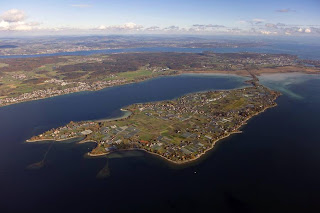This weekend my husband and I took a ferry from Radolfzell to an island called the Reichenau Island. This beautiful, relatively small peninsula (we walked the circumference in only a few hours) was admitted into the UNESCO World Cultural Heritage Sites as the "Monastic Island of Reichenau"in 2000. It is being protected for its 'cultural landscape giving an outstanding testimony to the religious and cultural role of a great Benedictine Monastery in the Middle Ages.'
Today, this island is known for its vast organic vegetable gardens that supply fresh produce to local markets. The island maintains a slower pace and is covered by a web of footpathes and trails. With each turn you find a green house or blooming field rich with life. The shores are littered with fishing boats and the beaches have little cafes to enjoy a warm drink. Vacant barrels, boats and buckets are filled with flowers and the air is damp with the smell of soil and pollen.
 |
| An old fishing boat transformed into a beautiful container for flowers |
Best of all, are the well-preserved churches that display monastic architecture from hundreds of years ago. Of particular interest, was a church's garden that we stumbled upon almost by accident. From reading a small, modest sign we were able to discern that this garden was a re-creation of a garden built between the years 830 to 840 by a monk named Walahfrid Strabo. He had built this garden in order to provide medicinal and cooking herbs to the monastery as well as ornamental plants for decorative use. The garden was rebuilt in 1991 according to Strabo's design complete with surrounding cloister walls.
 |
| The Herb Garden on the Reichenau today is a replica of the garden planted in the 11th century |
While walking through this garden I couldn't help but think of my love for herbs and their extensive functions. It is fasinating to imagine this monk planting sage, peppermint, oregano and roses. Our world has changed, but these plants, I'm sure, have remained very much the same. We tasted the peppermint, it was strong, sharp and delicious. I wonder if this herb had been also used to soothe upset stomaches, as it is used today.
 |
| One of many vegetable gardens on the Reichenau Island |
"after you die, everything you ever owned doesn't matter, and everything you ever did, does."
By planting a garden of common herbs and plants this monk made his place in the world and reminded us of the importance of herbal wellness and health. Our time on this planet might be fleeting, but herbs and plants will continue to support us, heal us and delight our taste buds. It is an insight that I am grateful for, and now, more than ever, am I excited to nurture a garden of my own.

No comments:
Post a Comment